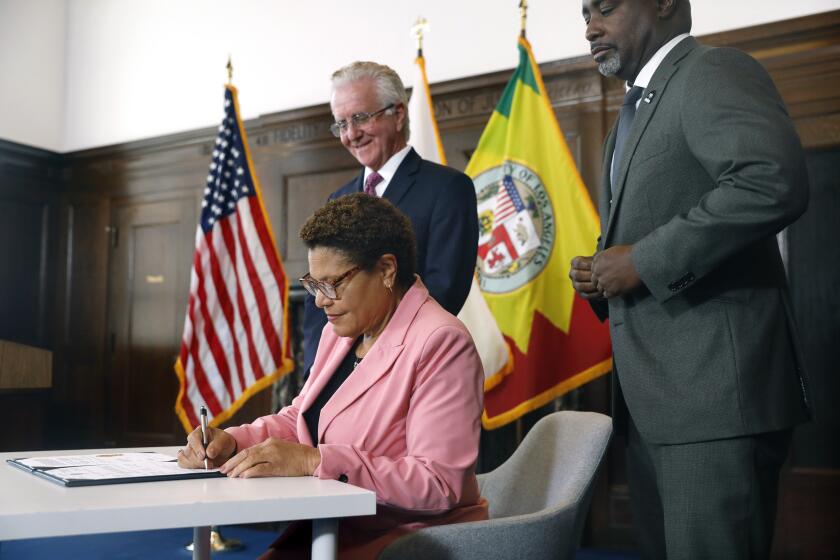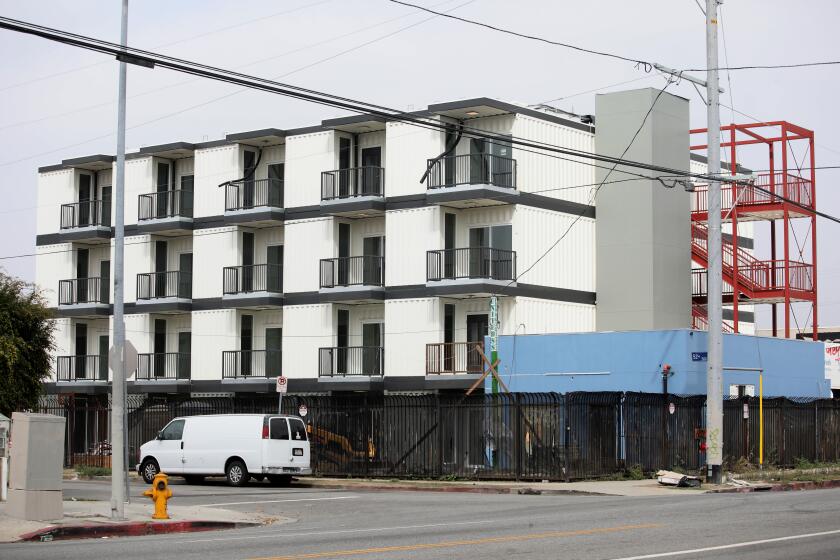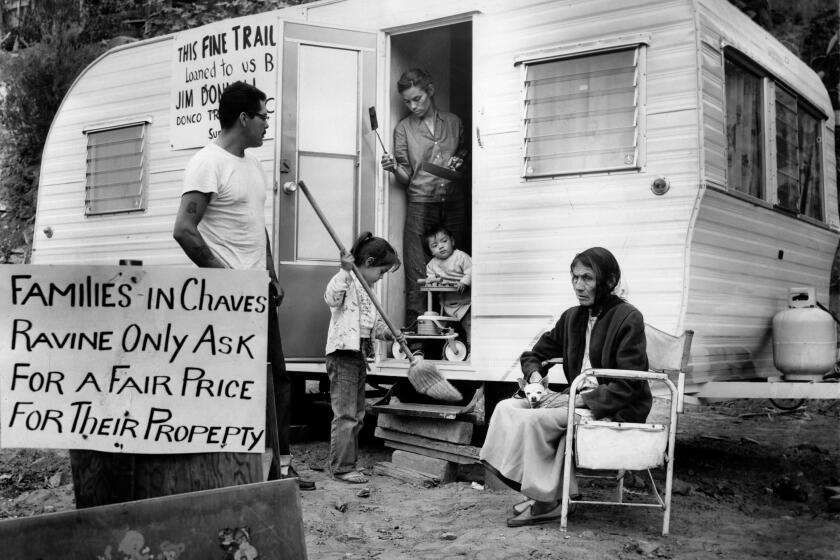Editorial: It’s a shame California voters won’t be able to dump this racist anti-housing policy in November

This was supposed to be the year that California voters got the chance to right a historic wrong by repealing a racist, classist provision in the state Constitution that makes it harder to build affordable housing.
The California Legislature voted unanimously to put a constitutional amendment on the ballot to repeal Article 34, which requires that cities get voter approval before they build “low-rent housing” using public money. Article 34 was adopted in 1950 amid a discriminatory backlash against public housing, and it’s been a burden to building low-income housing in a state desperate for more affordable homes.
The city might make permanent a directive from Mayor Bass that streamlines development. But in its current form, the policy threatens to make low-income Angelenos homeless.
Lawmakers planned to put the constitutional amendment to a vote in November, but the ballot has become increasingly crowded with at least a dozen measures and initiatives, which drives up the cost of running a political campaign. Without a war chest for a statewide public education effort, Sen. Ben Allen (D-Santa Monica) said he would pull the amendment and wait for a “quieter” election.
It’s disappointing that lawmakers are putting the Article 34 repeal on the back burner, but the decision is understandable. And because the state has adopted workarounds, including an expansive law passed last year to exempt more affordable housing from Article 34, it’s not the hurdle it once was. Still, lawmakers shouldn’t give up on the repeal; it’s important to excise this ugly law from the state Constitution even if it’s difficult.
Winning at the ballot could be tough. Californians are still hesitant to give up local control — even when it exacerbates the state’s crippling housing shortage.
Pouring money into trying to solve homelessness without also making it much easier, faster and cheaper to build housing, especially affordable housing, is a fool’s errand.
Voters have been asked to eliminate or weaken Article 34 three times since 1950, and each time they said no. The last effort was in 1993. Allen worked with former Los Angeles Mayor Eric Garcetti on another repeal attempt in 2020. That was shelved. Advocates eyed 2022 but then decided to wait for 2024 so they would have time to raise money for a public education campaign on the state’s ugly history of housing discrimination.
Advocates for the repeal found in polling that voters initially oppose giving up their right to control what gets built in their community. But they support the repeal once they understand the racist roots of Article 34 and the way it has fueled segregation and inequality.
A community was uprooted for the land that became home to Dodger Stadium. The city of Los Angeles should make amends to the displaced families of Chavez Ravine.
A real estate industry group drafted the original initiative in 1950. It was framed as a way for residents to preserve “local control” by requiring voter approval for public housing. But the campaign also warned that public housing was a form of socialism and a threat to capitalism, and was being pushed by “minority pressure groups.” Giving voters the right to veto public housing was another way to let them bar low-income and minority residents from moving into their communities — although it was wrapped in the guise of grass-roots democracy.
Article 34 stymied thousands of units of public housing development in California. By 1968, voters across the state had turned down nearly half the public housing units that had been proposed, and many other projects were shelved rather than put to the uncertain outcome of a vote. Courts later decided that cities and counties may hold elections to authorize an overall number of public housing units to be built, rather than go to voters for each individual project. While that’s made it easier to get low-income units built, holding an election is still an expensive and time-consuming hurdle.
Los Angeles in 2022 put Proposition LH on the ballot to authorize up to 75,000 units of new publicly funded affordable housing across the city. It passed with 70% support. Last year Gov. Gavin Newsom signed Allen’s Senate Bill 469, which exempts from Article 34 any project that receives a grant or loan from the state Housing and Community Development Department or a state tax credit. That covers the majority of subsidized low-income housing developments.
Article 34 remains a stain on the state Constitution, and lawmakers should keep working to repeal it. There’s another amendment still planned for the November ballot — to repeal Proposition 8, which banned same-sex marriage but was overturned and remains zombie-like in the Constitution. LGBTQ advocates worry that the increasingly conservative Supreme Court could reverse protections for same-sex marriage and revive Proposition 8.
Likewise, there’s no good reason to keep Article 34 on the books, only the risk that it could be misused. It should be removed from the California Constitution. If not in November, then soon.
More to Read
A cure for the common opinion
Get thought-provoking perspectives with our weekly newsletter.
You may occasionally receive promotional content from the Los Angeles Times.













